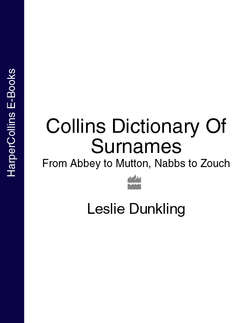Читать книгу Collins Dictionary Of Surnames: From Abbey to Mutton, Nabbs to Zouch - Leslie Dunkling - Страница 6
BLENDED NAMES
ОглавлениеOur remote ancestors had a single name, referred to throughout this dictionary as a personal name. The Anglo-Saxons and their Germanic cousins usually formed such names by using words that had become conventional name components. Those who make a particular study of names (onomatologists) refer to these name components as elements, and they are described as such in the entries which follow. Germanic name elements often referred to abstract qualities such as ‘fame’ or ‘strength.’ Some other favourite themes were words meaning ‘riches,’ ‘battle,’ ‘brave,’ ‘elf’, ‘beloved,’ ‘rule,’ ‘raven,’ ‘victory,’ ‘power,’ ‘friend,’ ‘wolf,’ ‘protection,’ ‘bright,’ ‘old,’ ‘peace,’ ‘gift.’ In forming a name for a child, one of the elements from the father’s name might be combined with one from the mother’s name to create a new name. It was not necessary for the two parts of the name to complement each other in meaning. Wulfram, for instance, was not meant to have an overall sense, linking ‘wolf’ and ‘raven.’ That is why it has been necessary in this dictionary to use a rather long-winded formula and say something like ‘Wolfram (one of the modern forms of the surname), descendant of someone who bore the Germanic personal name Wulfram, composed of elements meaning “wolf” and “raven.”’
As it happens, this method of creating a name from parts of other names continues in modern Britain to some extent, though it is normally restricted to minor naming systems. A typical example would be a William and Mary using parts of their names to create Wilry, say, or Wilmar as a house-name or a name for their boat. Modern formations of this type are usually known as blends.
